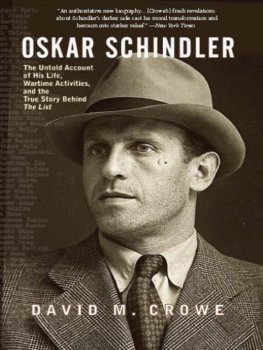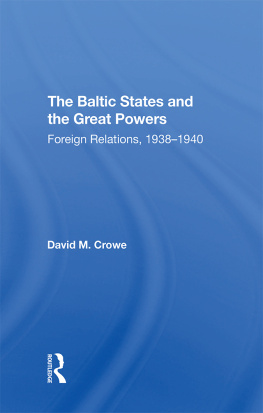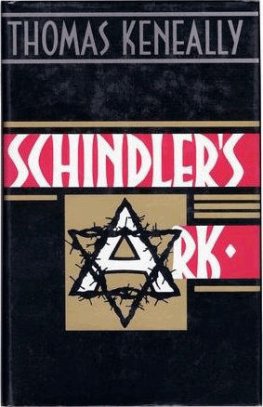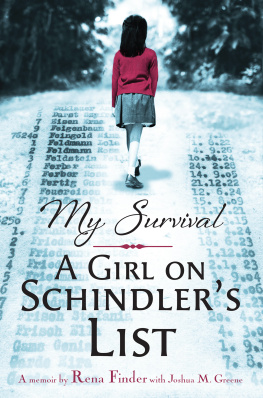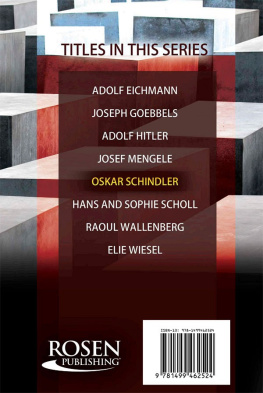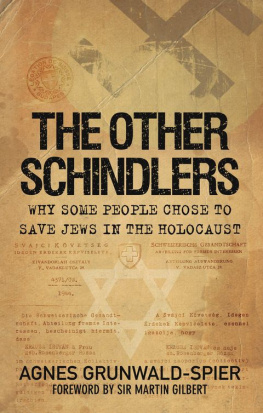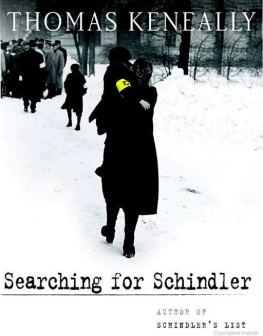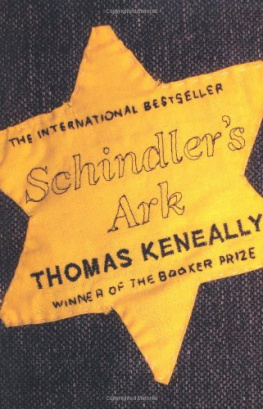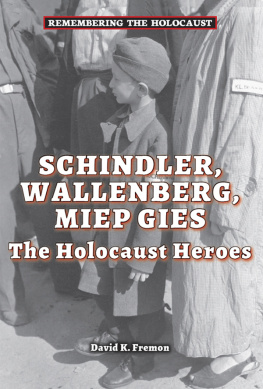David M. Crowe
OSKAR SCHINDLER
THE UNTOLD ACCOUNT OF
His Life, Wartime Activities,
AND THE TRUE STORY BEHIND
the List
TO
Sol Urbach
AND
Chris and Tina Staehr
IN MEMORY OF
Richard H. Moore
AND
Leopold PfefferbergPage and
Dr. Dieter Trautwein
PREFACE AND ACKNOWLEDGMENTS
The initial idea for this book came about during a conversation I had in the fall of 1996 with my editor at Westview Press, Peter Kracht, who is now the Editorial Director of Praeger Publishers. Peter and I had worked together on several books, and he wanted to know whether I had any ideas for a new one. I told him that I would love to do a biography of Oskar Schindler because, despite his fame and new place in the Holocaust field, there was no scholarly work on him. Peter was intrigued by the idea and told me to send him a book precis and outline. The rest, as they say, is history.
I began working on this book in 1997 and never imagined that it would take seven years to complete. The discovery of the vast collection of Oskar Schindlers private papers in 1997 and its public release two years later forced me to expand my research because these papers raised new questions about Schindler and opened up new avenues of research. I worked with several editors at Westview Press during this period. The most important was Steve Catalano, who carefully nurtured the book through its final stages. He is an authors editor.
During my research, I had to rely on the expertise and kindness of quite a few people who are far too numerous to mention individually. Needless to say, the pace and depth of my research would have been far less successful if it had not been for these individuals. Little appeared in the historical literature on Oskar Schindler, so I had to rely on Thomas Keneallys novel, Schindlers List, and Steven Spielbergs film of the same title as my initial guideposts to research. My research plan was quite simple to go back to the beginning of Schindlers life in Bohemia and Moravia and then gradually move forward chronologically with research in the Czech Republic, Poland, Germany, Israel, Argentina, and the United States. My plan was to blend archival research with interviews of anyone who knew Oskar or Emilie Schindler.
I also decided that to explore successfully the archives of the Czech Republic, Poland, Germany, and Argentina, I would need research assistants to help me with my work and interviews in each country. I should like to thank Dr. Ilona Klmov, Konstancja Szymura, David Fuhr, and Dr. Adriana Brodsky for their invaluable assistance during the numerous trips I made to these countries during the course of my research. I also had to rely on linguists to help me translate the mountain of documents, much of it handwritten, in eight languages. I should like to thank Jenny Raabe, Yudit Natkin, and Tomasz Jaskiewiszs tireless translating of very difficult, hard-to-read and aging documents.
Equally important were individual archivists, historians, and others in the Czech Republic, Poland, Israel, Germany, Argentina, and the United States who did everything possible to insure the success of my work. In the Czech Republic, I should like to thank Dr. Jitka Gruntov and Radoslav Fikejz; in Great Britain, Robin ONeil; in Poland, Leszek wiatek; in Israel, Dr. Sara Bardosh, Dr. Mordechai Paldiel, and Dr. Moshe Bejski; in Germany, Mietek Pemper, Dr. Wolf Buchmann, Dr. Uwe Vorktter, Claudia Keller, Stefan Braun, Susan and Michael Fuhr, and Dr. Dieter and Ursula Trautwein; in Argentina, Francisco Wichter, Ilse Chwat, Monika Caro, Ilse Wartenslebens, Elias Zviklich, Werner Krowl, and Roberto Alemann; and in the United States, Elinor Brecher, Sherry Hyman, Ned Comstock, and Daisy Miller. I am eternally grateful to each of the Schindler Jews who shared their memories of Oskar Schindler with me.
It is difficult to find the adequate words to thank my wife, Kathryn, for all of the hard work and support she put into helping make this book possible. In addition to carefully reading each chapter and offering advice on every aspect of the book, she cheerfully put up with my long absences during the research and writing phases of the manuscript. This book would not have been possible without her undivided love, support, and encouragement.
I should like to dedicate this book to three individuals who played an important and inspiring role in all aspects of my research and writing Sol Urbach and Chris and Tina Staehr. Sol was that rare Schindler Jew who worked for Oskar Schindler in Emalia and Brnnlitz. More important, he was able throughout the course of my research and writing to give me realistic, unromantic insights into the heart and mind of Oskar Schindler during the war years. Chris and Tina Staehr have been equally gracious and helpful. I was particularly moved by their generosity and sensitivity when it came to the question of the vast Oskar Schindler Koffer (suitcase) collection. Instinctively, they insisted that it be sent to Yad Vashem in Israel as a gift to the Jewish people. I am absolutely convinced that this is exactly what Oskar, who deeply loved Israel and is buried in Jerusalem, would have wanted.
This book is also written in memory of several people who passed away as I was working on it: my beloved brother-in-law, Richard H. Moore; Leopold Pfefferberg-Page; and Dr. Dieter Trautwein.
David M. CroweApril 10, 2004
1.
SCHINDLERS EARLY LIFE (19081938)
IT WAS THE WINTER OF 19471948 IN MUNICH. TED FEDER, A former American GI, was now deputy director of the Munich office of the American Jewish Joint Distribution Committee (the Joint; AJJDC). His boss, Samuel L. Haber, called Ted into his office and told him: Ted, theres a German out there who wants to see me. See him, see what he wants, and get rid of him. When Ted Feder walked into the outer office, he saw a German sitting there in traditional Bavarian clothing: winter Lederhosen (leather breeches with knee socks) and a felt cap with a feather in it. As Feder uncomfortably approached the German, a side door opened and one of the offices other workers, a Holocaust survivor, saw the German and cried out in Yiddish, Uns grettet, uns grettet [He saved us, he saved us]. The survivor then fell to his knees and began to kiss the Germans hands. The German was Oskar Schindler.1
At that time, Oskar Schindler was an impoverished former Sudeten German factory owner desperately searching for ways to survive financially during the postwar hardships in Germany. With the exception of the 1,098 Schindlerjuden (Schindler Jews) who survived the war in large part because of Schindlers efforts, few people knew of his exploits. Yet to many Schindlerjuden, he was already a god-like figure. This adoration was the basis for Schindlers extremely close relationship with many of his survivors until his death in 1974. My Jews or my children, as he often called them, overlooked Schindlers human failings and continually searched for ways to help their flawed hero maintain some semblance of a normal life, first in Germany, later in Argentina, and again in Germany. They helped him financially and looked for ways to honor him and tell the world about his unique efforts to save them during the Holocaust. The Schindlerjuden were driven, for the most part, by the deep love and admiration they had for him. When faced with Schindlers shortcomings, particularly after the war, many would explain that it was these very character flaws that made him so effective during the Holocaust. In reality, their love for Oskar Schindler was so deep and reverential that some would simply shrug off talk about his drinking and womanizing and say, Oh, thats just Oskar.
Yet who was this Oskar Schindler? Was he truly the revered savior portrayed in Steven Spielbergs film

